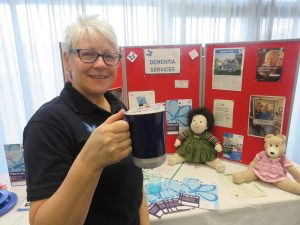News from our partners: Halls donates £4,000 to buy Droplet mugs that will help patients stay hydrated
News from our partners Shrewsbury and Telford Hospital NHS Trust (SaTH)
Every patient at Shropshire’s two acute hospitals will soon have access to a clever hydration aid, thanks to a generous gift from one of the region’s leading estate agents.
Halls, one of the oldest and most respected independent firms of estate agents, chartered surveyors, auctioneers and valuers in the UK, recently donated £4,000 to the Dementia Team at SaTH to roll out its Droplet scheme.
The scheme involves a dementia-friendly mug and plastic tumbler playing pre-set messages to patients not drinking regularly enough. They can be programmed with personalised messages from patients’ families and help ward staff keep a check.
David Giles, Managing Director at Halls, said:
“My mother sadly passed away last year but during her stay at the Royal Shrewsbury Hospital (RSH) I was incredibly impressed and humbled by the amazing care shown to her.
“The nurses were amazing, but with more and more people living with dementia every day it is imperative that our hospitals have the best equipment possible to help deliver the safest and kindest care.
“More than half of the beds at the trust’s two hospitals are occupied by patients living with dementia, so therefore we were delighted to hear how the money would be spent on something that is proven to reduce the chance of patients becoming disorientated and confused.”
Until now the Droplet scheme has been running on four wards, but the donation means it will be rolled out across both hospitals much sooner than anticipated. During the trial period, early indications showed people who used the smart mug and tumbler drank far more liquid than those who did not.
The mug has a broad, stable base and chunky open-ended handle to allow patients with weak or swollen hands to easily grip it with one or both hands. It insulates the heat of the drink so patients can hold the mug without burning their hands and there are measuring lines to record fluid levels.
The tumbler is similar in the way it works but it is tinted blue, giving the impression of fresher, cleaner and colder water, making it look more appealing to drink from.
The light and sound reminder base, which can be attached to the mug or tumbler, plays pre-set or personalised messages if it hasn’t been drunk from for a certain period; it has warning lights that flash to remind the patient to drink, and alert ward staff if it has not been drunk from; and the base glows to help the patient find their cup at night.
Karen Breese, Dementia Nurse Specialist at SaTH, said:
“We are incredibly grateful to Halls for their very generous donation.
“The appearance of the new mugs and tumbler is much more appealing, and the feedback we have received has been overwhelmingly positive.
“The evidence shows that people who have access to one of these mugs drink far more fluid, and thanks to Halls we are now able to purchase 200 more of them so they can be rolled out across both hospitals.”
The dementia-friendly mug and plastic tumblers are just the latest in a series of innovations introduced by SaTH for people living with dementia. Others include:
- Dementia Dolls, which when used in the right way, and given to the right patient, can have a phenomenal impact. They can bring back happy memories of parenthood and help people have a role to nurture and care. It can also improve communication and confidence.
- Twiddlemuffs, thick hand muffs with bits and bobs attached to the inside and out which are designed to provide a stimulation activity for restless hands for patients with dementia.
- Snack boxes, to provide small amounts of fresh finger food over a 24-hour period to supplement regular meal times. In the later stages of dementia the most important thing is making sure a patient takes on a higher-calorie diet as appropriate to their need.
- Blue crockery, provided following research at the University of Stirling that shows it is easier for patients living dementia to distinguish what food they are eating when it is presented on a blue plate opposed to a white plate.
- The Butterfly Scheme, which uses a butterfly symbol to quickly and discreetly identify patients with dementia or confusion.
- The Carers Passport, encouraging carers to visit and stay with patients living with dementia in order to provide reassurance, support, and help with eating and drinking and other day-to-day activities.
- This Is Me, a leaflet that people living with dementia can use to tell staff about their needs, preferences, likes, dislikes and interests.


